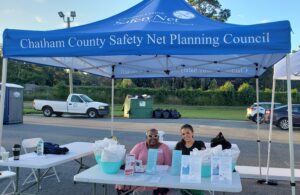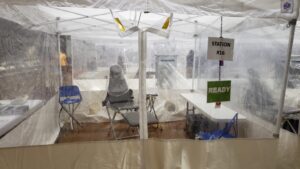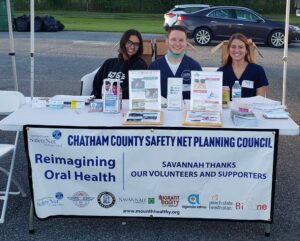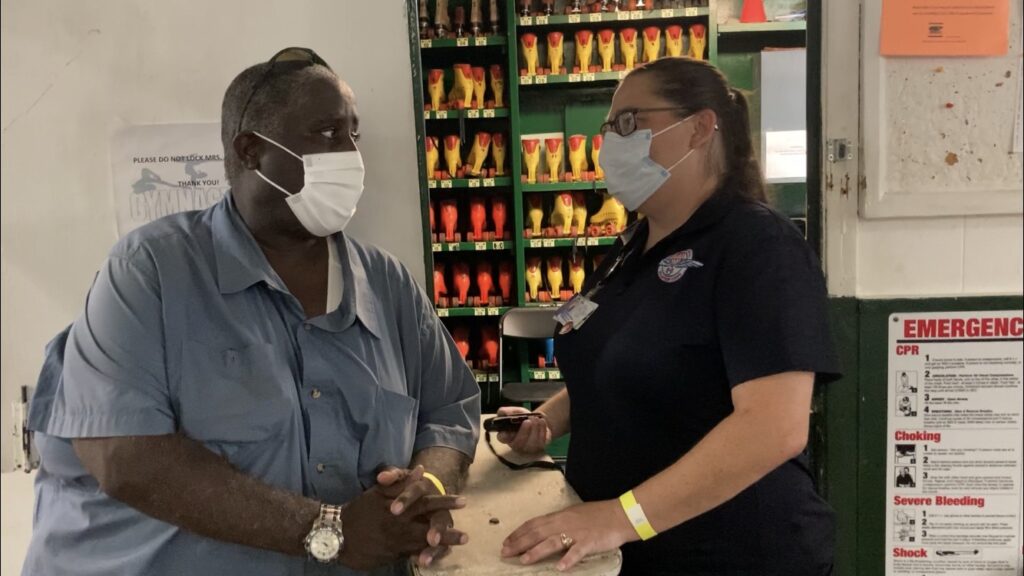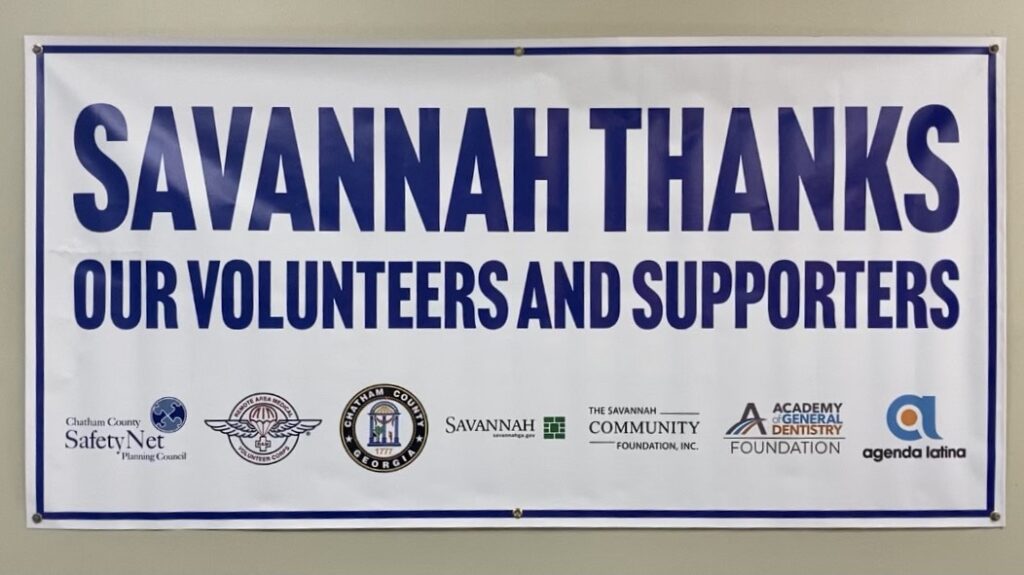Savannah Philanthropic Partners donates $50,000 to Safety Net Planning Council
SAVANNAH, Ga. (WTOC) – A program aimed at making a difference for young people at risk for suicide getting a show of support from women in the community today.
Women, children and mental health – that’s the focus of the Savannah Philanthropic Partners…guiding how they make one big donation each year.
This year, the group is sending their $50,000 donation to Chatham County Safety Net Planning council.
The group was founded by four women just three years ago…and now includes 41 women…all who do a lot of work to make sure their donation has the greatest impact possible.
“We all decided that instead of diving up the $50,000, we wanted to have one large sum going to a non-profit that would make a big difference,” said Jean Ahrens, the founder of Savannah Philanthropic Partners.
The Safety Net Planning Council runs several programs – including trauma-sensitive yoga and Front Porch ACTS for at-risk youth.
Those are all offered at no cost to the community.
Source: WTOC, Published: Jan. 10, 2023
Community Organizations to Receive State of Hope Funding
Atlanta, GA – The Georgia Department of Human Services (DHS) today announced the newest batch of State of Hope sites. The 26 selected sites will receive technical assistance and funding from DHS’ Division of Family and Children Services to invest in safety nets that ensure Georgia’s children and families are safe, thriving, and full of hope.
“We were thrilled by the volume of ideas submitted this year and to be able to offer funding to a record-breaking number of organizations,” said LaMarva Ivory, DHS’ Deputy Commissioner for External Affairs. “These hope-givers make our communities stronger and more nurturing. We look forward to seeing their continued, positive impact on Georgians’ safety and success.”
The 2022 awardees [including the Chatham County Safety Net Planning Council] comprise nonprofits spanning 13 regions of the state. View the full list and project summaries here. Since its 2018 launch, State of Hope has supported more than 300 organizations, all of which remain in the Hope Ecosystem, where they continue to connect, learn, and collaborate to create family-centered support systems.
What is State of Hope?
State of Hope is an initiative that seeks to encourage nonprofits, philanthropies, government, businesses and communities to collaborate closely to build local safety nets that will prevent conditions that contribute to disparities in education, threaten a family’s self-sufficiency and could lead to child abuse and neglect.
Our ultimate vision is having 14 Regions of Hope across Georgia. This could be one or multiple sites/projects in each region.
To learn more about State of Hope, visit dfcs.georgia.gov/state-hope. For general questions, or to be added to the State of Hope mailing list, please email stateofhope@dhs.ga.gov.
Source: Georgia Department of Human Services, Published November 10, 2022
September in Savannah: Suicide Prevention Awareness Month
September is Suicide Prevention Awareness Month. We use this month to promote safety, resilience, and peace in our community.
Join Savannah-Chatham community organizations for events and gatherings aiming to bring people together, share resources, and spread compassion and hope.
YOU ARE NOT ALONE. WE ARE WORKING TOGETHER.
FRIDAY 9th, 9:30AM
Commission Chambers of the Old Courthouse
Chatham County Board of Commissioners
Proclamation of September as Suicide Prevention Awareness Month
SATURDAY 10th, 9AM-1PM
Georgia Southern Armstrong Campus
- Road to Resilience Symposium
Free conference on trauma, mindfulness, resilience, wellness, suicide prevention and more!
Register HERE - Brake the Stigma Mental Health Awareness Car Show
Amazing vehicles, vendors, raffles, awards, giveaways, food trucks, and more!
Event Details HERE
TUESDAY 21st, 9AM-10:30AM & MONDAY 26th 11AM-12:30PM
The Community Resiliency Model (CRM)
Free skill-building wellbeing workshops.
Register HERE
THURSDAY-FRIDAY, 22nd-23rd, 9AM-4PM
Applied Suicide Intervention Skills Training (ASIST)
Free 2-day training in suicide first aid.
Register HERE
SATURDAY 24th, 9:30AM
Lake Mayer Park
Out of the Darkness Savannah Walk
A journey of remembrance, hope, and support.
Event Details HERE
SUNDAY 25th, 12-4PM
Daffin Park
Savannah Day of Peace: Peace in the Park
A Peace Parade, Courageous Conversation Circle, Wellness Area for Mental Health, Youth Artist Corner, 2022 Peace builder Award and more!
Event Details HERE
Planning Council Holds Another Successful RAM Free Dental Clinic
CHATHAM COUNTY, Ga. – Remote Area Medical-RAM® Free Dental Clinic hosted by the Chatham County Safety Net Planning Council (Planning Council) provided the second free dental care pop-up clinic on August 27-28th for Chatham County residents at the Garden City Recreation Center.
Over the event weekend volunteers treated 237 patients, which included 14 children. Procedures included 334 extractions, 36 fillings, and 52 cleanings. Oral cancer screenings were performed for 137 patients with 4 being referred to dentists for follow-up. Hearing tests were performed for 71 patients.
Patients were also able to receive COVID-19 vaccines and learn about various community programs and services from the participating vendors, volunteers, and partners to include UGA Extension, Deloach Lupus Foundation, Migrant Equity Southeast, Agenda Latina, Savannah Technical College Dental Hygiene, C.O.R.E., JC Lewis Primary Health, Curtis V. Cooper Primary Health, CareSource, Mary’s Place, Bio-One, Peach State Health Plan, and the Communications and Disorders master’s program at Georgia Southern University.
The clinic received financial and in-kind support from Chatham County Board of Commissioners, City of Savannah, Remote Area Medical-RAM®, Migrant Equity Southeast, Agenda Latina, Peach State Health Plan and Bio-One.
Patients spoke about how access to these services will improve the quality of their lives in ways from relief from pain to improve confidence when smiling. Outcomes from this event speak to the importance of providing accessible and affordable oral health services and addressing health disparities in the community.
The Planning Council’s Executive Director, Mr. Reginald Lee, who wholeheartedly and successfully has led this effort for the past two years with a great team of professionals and volunteers, thanks all of the partners and supporters of the Free Dental Clinic.
Ms. Lizann Roberts Recognized for Supporting Community Suicide Prevention
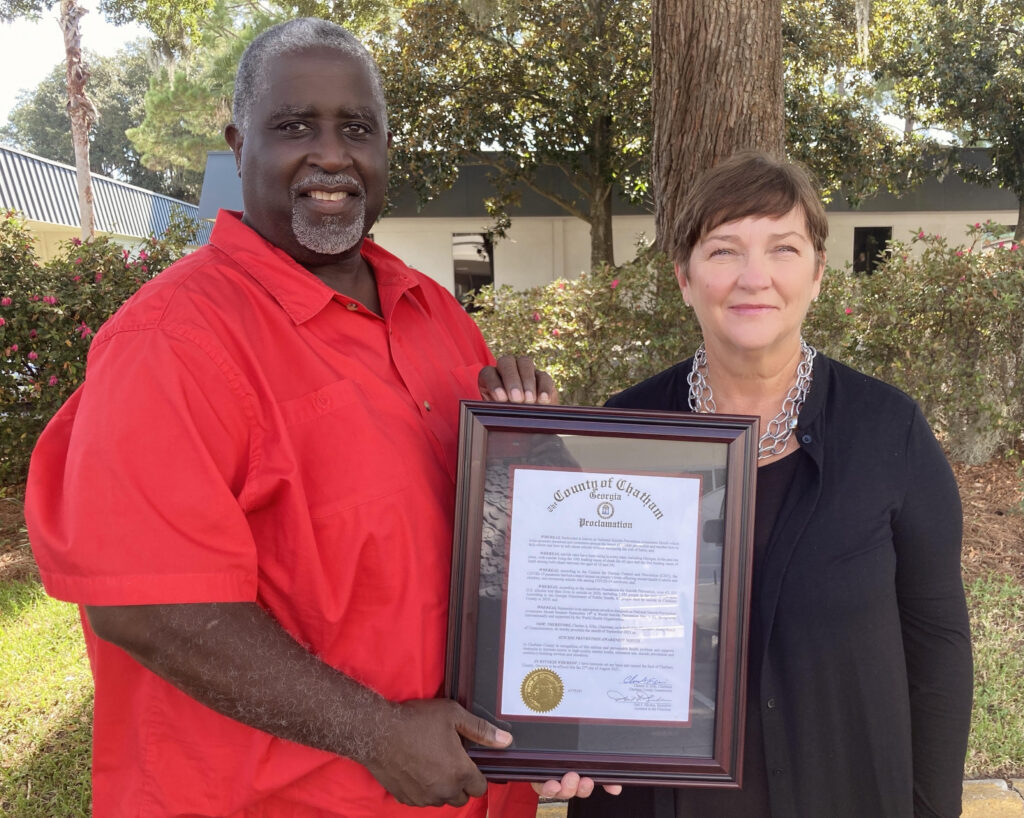 The Chatham County Board of Commissioners recognized community-based suicide prevention and resiliency-building efforts with a proclamation in September, which is suicide prevention awareness month. Ms. Tara Jennings, Strategic Planning Administrator at Chatham County, accepted the proclamation on behalf of community partners working together to build a suicide safer Chatham County.
The Chatham County Board of Commissioners recognized community-based suicide prevention and resiliency-building efforts with a proclamation in September, which is suicide prevention awareness month. Ms. Tara Jennings, Strategic Planning Administrator at Chatham County, accepted the proclamation on behalf of community partners working together to build a suicide safer Chatham County.
The proclamation was shared with Ms. Lizann Roberts, Executive Director of Coastal Georgia Indicators Coalition (CGIC), in recognition of her strategic leadership and fundraising accomplishments supporting mental health, suicide prevention, and resiliency-building initiatives in the community.
“Ms. Roberts is a key partner and leader whose vision, energy, and ability to bring community stakeholders together have been essential in creating sustainable and impactful programs,” said Ms. Vira Salzburn, Program Director for Safety & Resilience Programs at Chatham County Safety Net Planning Council (CCSNPC). “She is a wonderful partner and always willing to drive change through real collaboration.”
“We appreciate Ms. Roberts and her unwavering support of the Planning Council,” said Mr. Reginald Lee, CCSNPC Executive Director. “We are looking forward to continuing our work and making a difference in the lives of our residents.”
Read the proclamation here.
Planning Council Successfully Implements RAM Free Dental Clinic
CHATHAM COUNTY, Ga. – Remote Area Medical-RAM® Free Dental Clinic hosted by the Chatham County Safety Net Planning Council (Planning Council) provided a free dental care pop-up clinic on August 28-29th for Chatham County residents at the Garden City Recreation Center.
In just 2 days, more than 100 volunteers treated 174 underserved and uninsured individuals providing $77,513 worth of free oral health services including cleanings, extractions, fillings, and root canals. Additionally, 165 oral health cancer screening were completed by faculty and students from the Georgia Southern University, Communication Sciences and Disorders program.
Patients were also able to receive COVID-19 vaccines and learn about various community programs and services from the participating vendors, to include Rape Crisis Center, The Salvation Army, St. Joseph’s/Candler African American Resource Center, Migrant Equity Southeast, Community Organized Relief Effort (CORE), and Communications and Disorders master’s program at Georgia Southern University.
The clinic received financial and in-kind support from Chatham County Board of Commissioners, City of Savannah, Remote Area Medical-RAM®, Agenda Latina, The Savannah Community Foundation, Academy of General Dentistry Foundation, and Bio-One.
Tears of relief and and happy smiles from grateful patients spoke to the importance of providing accessible and affordable oral health services and addressing health disparities in the community.
The Planning Council’s Executive Director, Mr. Reginald Lee, who wholeheartedly and successfully led this effort with a great team of professionals and volunteers, thanks all of the partners and supporters of the Free Dental Clinic.
ABC Nightline Highlights the Work of the Planning Council
On a small stage in Savannah, Georgia, an officer with the city’s police department puts his improv skills to the test Wednesday in an acting class. In part, the class was meant to teach the students about observational awareness while also fostering community relations.
Anthony Watkins is an officer with the Savannah Police Department who took part in the class. The improv drill asked participants in the class to pretend they’re on a bus and to mimic the bus driver’s overly theatrical behaviors.
“I think as far as what I’m learning today, this is just not my comfort zone,” Watkins told “Nightline.” “Even being in this class for a short time today is just kind of pushing me to work and operate in a way that I would never have thought of before.”
The exercise, which requires participants to observe the driver and act on social cues, made Watkins feel stressed, he said. But he also sees the benefit of being taken out of his comfort zone.
“I think, as police officers, we’re always taught to be that authority … figure that is taking charge on scene and wanting to move in one specific direction,” Watkins told “Nightline.” “[The training] is kind of important to break us out of our comfort zone to where we can really achieve a personal connection. … Once you have that personal connection, it kind of creates a bond where a more peaceful resolution could be achieved.”
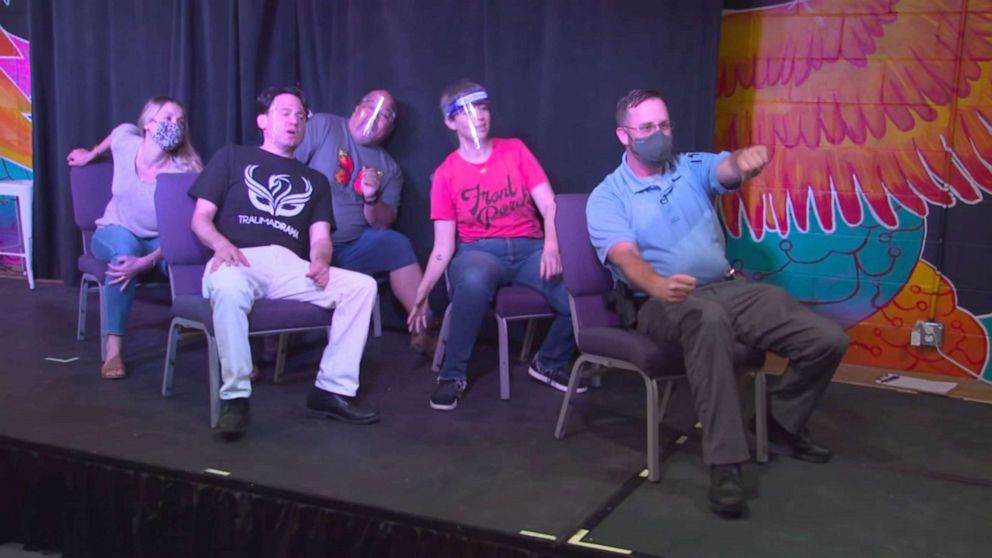
Photo by ABC News: Anthony Watkins, an officer with the Savannah Police Department’s Behavioral Health Unit in Georgia, takes part in a police training class meant to help officers learn de-escalation techniques.
Watkins took part in the training amid a week of protests following the death of 20-year-old Daunte Wright. Wright was killed during a traffic stop in Brooklyn Center, Minnesota, just miles away from where George Floyd died last year and where his accused murderer, ex-police officer Derek Chauvin, is currently standing trial.
Wright, a father to a 2-year-old boy, was killed Sunday by Brooklyn Center police officer Kim Potter, who claimed she’d mistaken her handgun for a stun gun during the stop. Potter, along with Brooklyn Center Police Chief Tim Gannon, submitted their resignations Tuesday. On Wednesday, Potter was arrested and charged with second-degree manslaughter.
As Wright’s death tears open old wounds, some police departments have been working to change the way their officers approach their jobs and the lives they’re entrusted to protect and serve.
University of Maryland Professor Rashawn Ray focuses his work on police relations with the community. He says that a lot of police are often trained more for use-of-force situations when they’re more often called for situations related to “the exact opposite.”
“Nine out of 10 calls for service have nothing to do with violence at all,” he said. “As we’ve seen of late, and with more video evidence, we are oftentimes seeing police officers escalate situations themselves, making them more violent and aggressive than they should be. So, what we have to do is create training that speaks more to social interactions, speaks more to officers creating what they call ‘time and distance’ so that they can make more objective decisions instead of simply relying on playing up tactics.”
Vira Salzburn, of the Chatham County Safety Net Planning Council, organized the training program that Watkins participated in for the city of Savannah. She said the intention of the program is to bring local officers together with behavioral health providers and school employees so that they can all understand each others’ roles and the people they work with on a daily basis.
“Having law enforcement involved in our community work, doing this grassroots work, is so beneficial for going from otherness to togetherness, and really cultivating the sense of compassion for each other, recognizing joys and sorrows that we may experience as a community,” Salzburn said.
The class is part of Watkins’ training in the Savannah Police Department’s Behavioral Health Unit. The department’s chief, Roy Minter, said the unit was launched after a review found that 3,700 calls from 2019 were not related to criminal acts but rather mental health crises.
“We realized, going through those calls for service, that what was really needed … was for those individuals to be evaluated by a clinician, to be connected to resources … and for them to have the opportunity to have some type of follow-up plan put in place to reduce recidivism for those types of calls,” Minter said.
Ray said a disproportionate amount of people who are ultimately killed by police are not only Black but also dealing with a mental health issue.
“The issue there is that in most police departments around the country, not only are they not trained in de-escalation and social interactions as they should be, but also they receive very little training on mental health identification,” he said.
Savannah Police Department’s Behavioral Health Unit was created with the intention of enhancing the department’s understanding of mental health. It’s comprised of two non-uniformed officers, unarmed officers and a licensed clinician. None of them wear a typical police uniform.
“We’re in a more comfortable, laidback uniform that is kind of designed to make people feel more comfortable. … We’re trying to stand apart from the rest of patrol because we’re trying to get there and calm the situation down and get people the help they need,” Watkins said.
People with untreated mental illness are 16 times more likely to be killed by law enforcement, according to the nonprofit Treatment Advocacy Center. The Savannah Police Department said its Behavioral Health Unit has enhanced its police services while also reducing the need for unnecessary force.
“There are several situations that I’ve experienced since being on the unit, and even before being on the unit, where there’s a contrast,” Watkins said. “Prior to having the behavioral unit, you would take the person to jail, and now we have more options. When we tell [people] that we’re taking a person in for treatment or taking a person to a mental health facility rather than jail, most often than not, they’re pretty happy with that.”
Savannah Police Department Detective Patrick Skinner has been working to change officers’ mindsets for years. He said it’s a conversation that has “become more open and urgent” and that many officers operate at a baseline of fear and caution.
“If I’m afraid that I’m going to be murdered at every single second of the job and I’m always operating in what they would call ‘code red,’ I’m always on high alert, that is toxic mentally. It’s toxic physically,” Skinner said. “It’s also toxic to the profession of community policing. If I’m afraid of my neighbors, then I’m going to react fearfully.”
Before working in Georgia, Skinner spent seven years working for the CIA’s Counterterrorism Mission Center in the Middle East. During his time in the Anbar Province of Iraq, he said they fell short with gaining the trust and cooperation of the Sunni community — an issue he was able to draw parallels to in Savannah.
“When I came home to Savannah and I started seeing that same rhetoric here where you get the community on your side — ‘We need the African American community; we need the Hispanic community on our side’ … I could understand quickly that it doesn’t make any sense,” Skinner said. “That’s impossible. You need to do it day by day, individual by individual.”
As a police officer, Skinner has been outspoken about what he’s seen in his community, even speaking out in articles and on social media about community policing and the importance of being a “neighbor.” One idea he’s tried to instill within the department is that the term “civilian” creates a divide between cops and the people they serve.
“The words we use are very reflective of the thoughts we have. … I understand that you’re trying to say people that are not police,” he said, adding that calling people civilians pits them against cops, even if it’s subconsciously. “It also says that the cops are military because by definition, you have two choices, civilian and military, and we are not military.”
Skinner said that incorporating simple behaviors, like calling the person who called 911 or driving with his windows down, have made differences in his ability to police effectively and humanely.
“The openness is the power,” he said. “I would just call someone and say, ‘Hey, I’m officer Skinner heading to your address.’ Whatever the call is, [I’d say], ‘Is everything OK?’ And most of the time they would tell you that the call was not as dramatic as it seemed.”
On keeping his window down, he said, “Because of my old jobs, you were always supposed to wave to people because it told them two things: It told people that you were looking at suspiciously that, ‘Hey, he sees me.’ It also told everybody else, ‘Hey, he sees me in a positive way.'”
Skinner said he waves at everyone because he wants them to see he’s engaged. He’s looking for the “briefest connection,” he said.
“There are no small acts of kindness or connection, and we just need to not pass them up,” he said. “The windows down was an easy thing.”
It’s this momentary connection between a police officer and his community that Skinner hopes will become a constant across police departments throughout the country.
“We have a warrior mindset that is taught, and it’s taught a lot … that our job is to enforce the law with zero empathy, zero compassion, zero understanding and the goal is compliance,” he said. “The goal of a police call is not compliance. The goal is whatever the point of the call is — a lost dog, stabbing, shooting, whatever. And so, I don’t like that warrior mindset. … I police because they allow me to and that’s not semantics. The consent of the community is how we have our job, and they have a say in how we do our job.”
Chatham County Safety Net Planning Council, Inc. Awarded Funding to Become a State of Hope Site
Savannah, GA – Chatham County Safety Net Planning Council, Inc. (Planning Council) was recently selected to become a designated State of Hope site and to receive funding to aid with project implementation.
During the third round of solicitations for “big ideas” from communities, the Planning Council submitted a proposal to serve the Chatham County area by developing and implementing Mindful Self-Compassion program to build resilience and enhance emotional wellbeing of its residents. More than 200 applications were submitted with approximately 10% of the applicants being selected to receive funding.
“We were very impressed with the applicants this year,” said DFCS Director Tom Rawlings. “Some are large and comprehensive, and others are smaller grassroots organizations who are just getting started, but all are changing lives for the better in their communities.”
The State of Hope initiative aims to transform Georgia into a collection of communities where children and families have all they need to thrive and succeed. Innovative local strategies and partnerships are key to achieving that goal and are asked to submit “big ideas” that focus on improving the lives of children and families in one or more of four categories: education, trauma-informed practice, quality caregiving, and economic self-sufficiency.
The State of Hope initiative was started in 2018 through a partnership between the Georgia Division of Family and Children Services, Georgia State University’s Center for Professional Excellence, and Georgia Family Connection Partnership. Currently, 253 organizations have been designated as State of Hope sites and belong to the larger community – the Hope Ecosystem – where they can access technical assistance and opportunities for funding, build partnerships, and connect with each other.
To learn more or participate in the State of Hope initiative, go to https://dfcs.georgia.gov/
Chatham County Safety Net Planning Council Announces New Executive Director, Reginald C. Lee
June 18, 2019 (SAVANNAH, Ga) — The Executive Board of the Chatham County Safety Net Planning Council (Planning Council) is pleased to announce that Reginald C. Lee will be joining the Planning Council as Executive Director on July 22nd.
Reginald earned a Bachelor of Professional Studies from Memphis State University, majoring in Human Service Administration. Additionally, he received a Master of Arts Degree, with honors, from Webster University concentrating in Management and Leadership.
During his 38-year career in social services, Reginald has been tireless in his efforts to serve the homeless and individuals that are disenfranchised, incarcerated, and people recovering from addictions.
Prior to accepting this position, Reginald has most recently served as the Director of Programs at Old Savannah City Mission. In the course of his career he has held various social service positions in Georgia, South Carolina, and Missouri. These positions include: Executive Director of United Methodist Metro Ministry, Director of Homeless Services for the City of St. Louis, Senior Associate for the United Way in St Louis, and Senior Human Service Specialist for the Darlington County Department of Social Services.
Reginald has been an active community advocate wherever he has lived and has served on many boards addressing social service needs. He is currently serving on the Board of Directors of the Chatham Savannah Authority for the Homeless, Savannah Care Center, and J.C. Lewis Primary Health Care Center. He has also served on the Board of Directors for St. Louis Area Food Bank, St. Louis Emergency Food and Shelter National Board, and the Lutheran High School Association of St. Louis. Reginald also served as a volunteer for the Kairos Prison Ministry.
Reginald is married to Dr. Rochelle Bornett Lee, an Assistant Professor of Nuclear Medicine Technology at Georgia Southern University. He and his wife have two adult children, Jocelyn and Reginald, who share his passion for human service as demonstrated by careers in healthcare and education.
Please help us welcome Reginald C. Lee to the Planning Council. In his new role as Executive Director, we are confident that he will continue to be a servant leader and an effective advocate and facilitator of community collaboration and cooperation in meeting community healthcare needs.
Multi-Stakeholder Collaborative in Chatham County Selected to Build Data Sharing Capacity through the DASH Mentor Program
A coalition of safety net primary health care providers; Curtis V. Cooper Primary Health Center, J.C. Lewis Primary Health Center, St. Joseph’s/Candler St. Mary’s and Good Samaritan Clinics, Memorial Family Medicine, Chatham CARE and social service providers and funders; the United Way of the Coastal Empire, City of Savannah, Chatham County as well as the Savannah-Chatham County Public Schools and Coastal Indicators Coalition have been selected by Data Across Sectors for Health (DASH), a national program of the Robert Wood Johnson Foundation, to participate in a 10-month mentorship program led by Chatham County Safety Net Planning Council to advance local efforts to share and use multi-sector data to improve community health.
As a DASH Mentee, they will connect with communities from around the country through All In: Data for Community Health, a peer-to-peer learning network that builds local capacity to systematically combine health data with data from other sectors like education, social services, and housing to acquire a more complete picture of the factors that influence health.
The Chatham Team will be working with 2-1-1 San Diego, a national leader in the development of a Community Information Exchange (CIE). CIEs are a collective movement and technology platform that shifts how health and social service providers deliver person-centered care. 2-1-1 San Diego mentorship will provide the toolkit to develop CIE infrastructure, interoperable technology, community network, legal frameworks, and sustainability.
Participation in the DASH Mentor Program will help the community come together and begin exploring the concept of a CIE for Chatham County and think through what that might look like.
The Chatham Team is excited to make meaningful connections with leaders in the field to accelerate learning and make significant progress towards aligning multi-sector partners around data-driven approaches that promote health equity.
To learn more, visit dashconnect.org/awardees/mentor-program/

